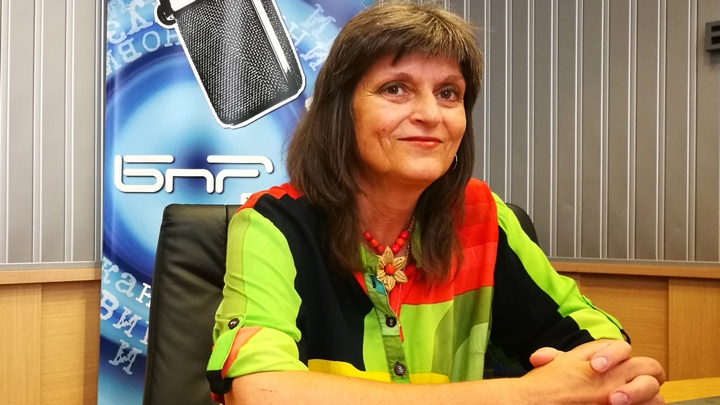Once again, Radio Bulgaria is among the prize-winners of the Worlds and Colours competition organized by the Association of Spanish-speaking Journalists in Bulgaria. The awards are for articles and programmes in Bulgarian and in Spanish bringing Bulgaria and the Spanish-speaking world closer. Two of them are in memory of Spanish language experts Svetlana Plashokova-Miteva (1963−2012) from Radio Bulgaria’s Spanish language service and Samuel Frances (1940−2012).
In the 8th edition of the competition, the Svetlana Plashokova prize – for bringing Bulgaria closer to the Spanish-speaking world – was awarded to Radio Bulgaria’s Spanish language service and our colleagues Daniela Radichkova, Hristina Taseva and Ventseslav Nikolov for a series of articles dedicated to the 110th anniversary of the establishment of diplomatic relations between Bulgaria and Spain. The Samuel Frances award for professional ethics and active citizenship was conferred on Radio Bulgaria’s Veneta Nikolova for her interview with Daniel Montiglio from Chile who lives in Varna and who created a platform for foreigners living in Bulgaria. Our colleagues Miglena Ivanova and Krasimir Martinov were also nominated and will receive certificates – Miglena for her article about a man from Argentina and his love of Bulgarian folklore and Krasimir for his article “Thinking of Bulgaria in far-away Argentina”. And the reason why there are so many of our colleagues among the prize-winners and nominees is that Radio Bulgaria and the movement of Spanish-speaking journalists have objectives that are very similar.

“Our association endeavours to bring people and cultures closer together, to acquaint the Spanish-speaking audience with what is happening in Bulgaria, and the Bulgarian audience with what is happening in the Spanish-speaking world,” says Kadrinka Kadrinova, deputy-chair of the Association of Spanish-speaking Journalists in Bulgaria. “Radio Bulgaria is just such a living and breathing bridge. It is the most accurate, reliable and genuine information the world can obtain about Bulgaria, and not only in Spanish but in many other languages as well. It is our window to the world. Thank God that in the face of adversity and despite the efforts to close it down, Radio Bulgaria still exists and will go on! That is why, in 2016, after the attempts made to shut down a great many of its foreign language services, Radio Bulgaria was awarded our honorary Bridging Cultures award.”
Now, in the conditions of pandemic, Radio Bulgaria’s role has been growing. When there are so many other restrictions “institutions like Radio Bulgaria can throw a very important human bridge,” Kadrinka Kadrinova says. Unfortunately, the fact that it is off the air restricts the live contacts with listeners. One such example of live contacts are the school children from a small village in Peru who listened to the Spanish-language programmers with much interest. Kadrinka Kadrinova saw for herself how strong this bond was during a visit to Peru by then President Georgi Parvanov:
“The colleagues from the Spanish service had prepared a parcel which was flown to Lima on board the presidential airplane. There, in a school far away in the Andes, a schoolteacher turned out to be a regular Radio Bulgaria listener. In one of his letters to Radio Bulgaria he wrote that the children needed notebooks, pens… And the people from the Spanish service sent notebooks, paints and other things the children needed. I think that this little episode speaks for itself, showing the kind of bond Radio Bulgaria had with its listeners around the world for decades. It even shows how Bulgaria touched the hearts of the people there, high up in the Andes, and I am sure they still remember it. I think these are very important episodes we should go back to and remember because people in such God-forsaken places do not have access to the Internet.”
The "Kabiyuk" horse breeding farm in the village of Konyovets is the oldest stud farm in Bulgaria, founded in 1864 by Midhat Pasha, the governor of the vilayet of Ruse, to produce horses for the Turkish army. The farm existed until the Russo-Turkish War..
There is no exact statistic on the number of Bulgarians living abroad, but a report from the Ministry of Foreign Affairs from last year indicates that around 2.8 million Bulgarians are living outside the country . According to the 2021 population census..
The nature protection organization WWF - Bulgaria is launching a campaign entitled "Subscribe to Nature". The disappearance of wild animals is a series in which we play the main role. In less than one human lifetime, 73% of vertebrates in..
The traditional Bulgarian Christmas picnic, organized by the Bulgarian Cultural and Social Association "Rodina - Sydney" and the Bulgarian School..

+359 2 9336 661
